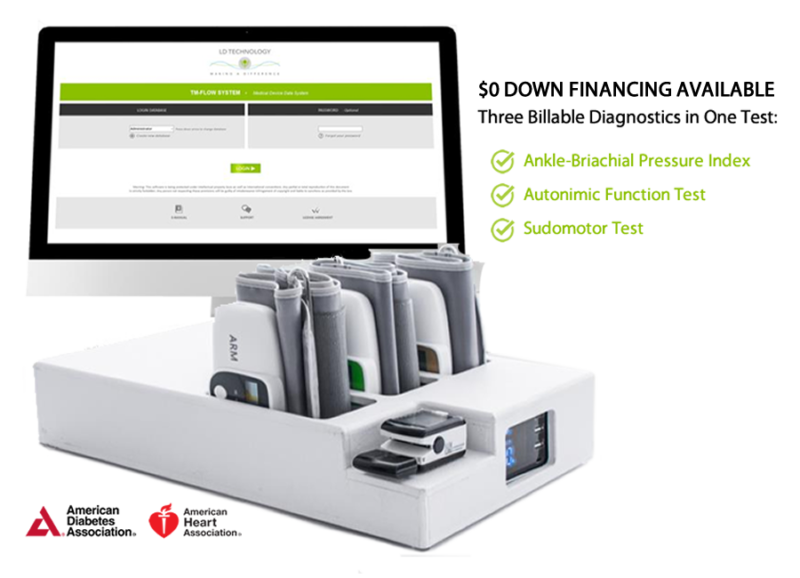Frequently Asked Questions
The TM Flow device offers numerous benefits for medical practices, including non-invasive and accurate testing, early detection of autonomic and arterial dysfunctions, and comprehensive diagnostics that reduce the overall cost of patient care. Additionally, the device’s tests are easy to bill with multi-code diagnostics, making it a valuable investment for enhancing patient care and optimizing practice efficiency. It also supports compliance with standards of care recommended by leading health organizations.
Yes, the TM Flow device is covered by Medicare and most private pay carriers. Specific CPT codes, such as 95921 for cardiovagal innervation and 93923 for ankle-brachial pressure index, ensure that the diagnostics are easy to bill. Coverage and reimbursements may vary depending on the Medicare locality, but the comprehensive diagnostics offered by the TM Flow device are widely recognized and supported by insurance providers.
Autonomic nervous system testing is crucial for diabetes and cardiovascular patients because it helps in the early detection of autonomic neuropathy, which is a common complication in these conditions. Early detection through ANS testing allows for timely intervention and management, reducing the risk of further complications. The American Diabetes Association recommends ANS testing as a standard of care for patients with Type 1 and Type 2 diabetes, highlighting its importance in effective diabetes management.
The TM Flow device is an advanced, non-invasive diagnostic tool designed to perform a series of tests that aid in the identification and early detection of autonomic nervous system (ANS) and arterial dysfunctions. It provides quantitative assessments of the ANS, helping to distinguish between early and late stages of autonomic neuropathy. The TM Flow device is particularly valuable for cardiovascular and diabetic autonomic neuropathy (DAN) testing, making it an essential tool in diabetes management and cardiovascular assessments.

TM Flow in Winter Park
The local population in Winter Park, Florida is suffering from diabetes. The number of people diagnosed with this disease has increased every year since 2006. Many cases of diabetes are undiagnosed and many people have a condition called peripheral neuropathy which can lead to significant pain as well as other symptoms. Peripheral neuropathy is diagnosed by a physician during an exam by measuring the amount of sudomotor activity on the patient’s feet with a device called Sudomotor Testing (ST). A study conducted by Dr Ann Steketee at Boston University School of Medicine found that ST was superior than traditional methods for diagnosing diabetic foot ulcers and amputations because it allows physicians to determine how well our bodies respond to changes in blood glucose levels without painful testing procedures or invasive procedures such as biopsies or MRIs. This means that patients who suffer from diabetic peripheral neuropathy can receive better treatment if their doctors use ST throughout treatment rather than waiting until something goes wrong before trying different therapies like Sympathetic Therapy via TheraVid (TM Flow).
The local population in Winter Park, FL is suffering from diabetes.
The local population in Winter Park, FL is suffering from diabetes. Diabetes is a disease that affects the body’s ability to produce or respond to insulin. Insulin is a hormone made by the pancreas that helps your body use sugar (glucose) for energy. When you have diabetes, either your pancreas doesn’t make enough insulin or your body can’t use its own produced insulin correctly.
Many of these diabetics have peripheral neuropathy.
Peripheral neuropathy is a common complication of diabetes and can be detected during a physical examination. It can lead to pain and other symptoms, as well as numbness and tingling in the hands and feet. A physician will also be able to diagnose peripheral neuropathy by performing blood tests or checking your nerves with an electromyography (EMG) test.
In addition, foot pain is very common in people with diabetes who have peripheral neuropathy. The Mayo Clinic says that it’s important to try wearing proper shoes with support, like everyday ballet flats or sneakers that are designed for plantar fasciitis or heel spurs. You should also avoid wearing high heels because they put additional stress on your toes and feet when you walk, which could cause further problems down the road if left untreated!
Peripheral neuropathy can lead to significant pain as well as other symptoms.
Peripheral neuropathy can lead to significant pain as well as other symptoms.
Diabetic peripheral neuropathy is a condition that causes damage to the nerves in your body. This damage can cause numbness, tingling, pins-and-needles sensations (paresthesia), and pain. It can also cause weakness in your arms and legs. The symptoms tend to be symmetrical—both sides of the body are affected equally—but they’re not always symmetric from one day to the next or one year to the next.
Symptoms are usually localized at first but slowly become generalized over time. Additionally, symptoms may increase with repetitive activity or cold temperatures; however, they generally do not worsen with rest or heat application such as warm water or a heating pad if used properly without covering over the area if possible – i have found this helpful).
Peripheral neuropathy is diagnosed by a physician during an exam.
Peripheral neuropathy is diagnosed by a physician during an exam.
Symptoms include pain, numbness, and tingling in your hands or feet.
Some tests may be done to see if you have this condition: nerve conduction studies and electrodiagnostic testing.
The diagnosis is made by a neurologist or other specialist. They can tell if you have peripheral neuropathy after doing tests on your nerves and muscles.
The TM Flow is an advanced diagnostics device that uses Sudomotor Testing to assess localized sympathetic function.
Sudomotor Testing is a diagnostic test that can be performed by a physician. One of the most popular tests for diabetes, Sudomotor Testing is performed by applying a small amount of temperature-controlled liquid to the skin. The results are analyzed within minutes and provide valuable insight into localized sympathetic function in relation to blood glucose levels and other important factors such as age and gender.
Sudomotor testing can provide physicians with a more precise and accurate means of assessing a diabetic’s risk for foot ulcers and amputation.
The test is performed by applying sodium chloride solution to the skin of your foot, which causes it to sweat. The pattern and amount of sweat production indicate how well your autonomic nervous system (ANS) is working. If it does not work properly, you may have a higher chance for developing peripheral neuropathy, which can lead to foot ulcers and amputations.
Sudomotor Testing can also help physicians pinpoint those patients who could benefit from Sympathetic Therapy via TheraVid (neuromodulation).
The TheraVid (TM Flow) is a unique device that uses Sudomotor Testing to assess localized sympathetic function. Using this approach, physicians can pinpoint those patients who could benefit from Sympathetic Therapy via TheraVid.
“The TM Flow allows us to provide patients with better outcomes because we are able to use Sudomotor Testing, which is a more precise and accurate means of assessing a diabetic’s risk for foot ulcers and amputation,” says Dr. Erickson.
Sudomotor Testing is covered by Medicare, many BCBS plans and Medicaid. It is thus also covered by commercial insurance companies on a fee-for-service basis.
You may be wondering if you’re covered for Sudomotor Testing. The answer is yes – many Medicare plans, BCBS plans and Medicaid cover Sudomotor Testing. It is also covered by commercial insurance companies on a fee-for-service basis.
Sympathetic Therapy through TheravVid (“TM Flow”) is reimbursed at $50 per treatment session (7 sessions) and may be billed twice per year. Each session lasts 15 minutes and the total cost of the 7 sessions is $350.
Sympathetic Therapy through TheravVid (“TM Flow”) is reimbursed at $50 per treatment session (7 sessions) and may be billed twice per year. Each session lasts 15 minutes and the total cost of the 7 sessions is $350.
TM Flow stimulates the sympathetic system in three ways: 1) The client takes a full breath in and holds it for 20 seconds, 2) The therapist taps on acupressure points near the eyes as well as other acupressure points on the head, 3) Tapping or rubbing on acupuncture points along meridians throughout the body.
Commercial payors will reimburse the claims sent to them and patients must only pay the co-payment associated with the claim (if any).
Commercial payors will reimburse the claims sent to them and patients must only pay the co-payment associated with the claim (if any).
The cost for each session is $350 and the total cost of 7 sessions is $2,000.
Conclusion
If you are a patient suffering from peripheral neuropathy in Winter Park, FL and would like to learn more about the TM Flow, please contact our office at (213) 537 -6144
RSS FEED
- The TM Flow is a highly reimbursable diagnostic in Portland, OR
- Pain Clinics in Albuquerque, NM Adopt the TM Flow as Gold Standard
- Neuropathy in Philadelphia, PA can be detected with the TM Flow device
- Pain Management Clinics in Dallas, TX are Using the TM Flow to Diagnose Symptoms
- Unlocking the Potential of ANS Testing: Insights for Healthcare Providers
- Neuropathy clinics in Savanah, GA use the TM Flow
- Come to Charleston, WV to Get a TM Flow
- How the TM Flow will maximize your physician practice in Boise Idaho
- Doctors in Pittsburg, PA are using the TM Flow for the treatment of neuropathy
- Which Patients Require ANS Testing?
